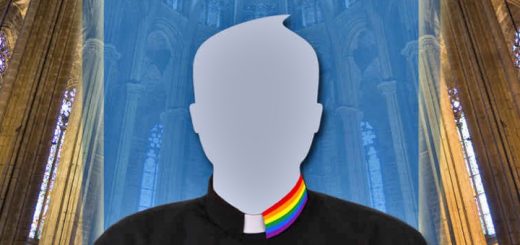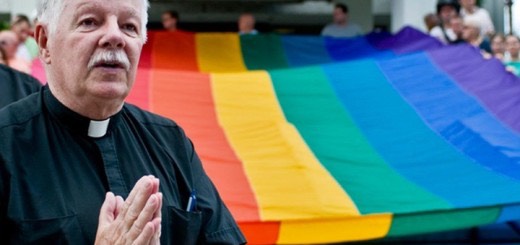When homosexuality is hidden behind the tale
Article by Erika Montecinos published on the website of the magazine by breaking El Silencio (Chile), freely translated by Dino M.
Sexual diversity is a controversial theme in the Catholic Church, of which, however, we do not speak when we are faced with priests or novices that have discovered their homosexual orientation within its files. Often ex seminarians and novices say that one of the reasons that pushed them to enter the seminars and convents was "to want to escape" and the desire to "reach healing" from their homosexuality. Healing that then did not even arrive with the help of all the saints.
Juan Cornejo, former diocesan seminarian and responsible for the Christian ecumenical community of gay and lesbians (Cegal) recalls that those who enter the seminary to escape their homosexuality "do nothing but deceive themselves". Although today "there is an excessive concern in the Church. And more importance is given to sexual orientation than to the same vocation".
In the 80s, during the vicissitudes of the military dictatorship in Chile, some young seminarians showed their political beliefs by participating in protests or in clandestine propaganda actions to overturn the regime. This activity was questioned by the clergy of the time and the decision was made to remove the novices that were involved in these facts.
However, the political reasons were not the only one for which one came and moved away, but also homosexuality and lesbism, within seminars and convents of Chile continues to be a secret and a taboo, in the presence of which those which manifest "these behaviors" are invited, with discretion, to withdraw from the congregation and to re -evaluate their vocation.
Many, today, have a life far from the talari clothes but remain close to the spiritual and religious ideal that they call vocation, not without having a critical eye towards the position that the clergy manifests about homosexuality. But the "revelations" of some "traviated sheep" did not wait for the rest of the world. In Spain, the priest José Mantero challenged the whole church of his country declaring himself openly homosexual from the pages of a gay circuit magazine.
"I give thank you to God for the fact of being gay," he said, and also said that "he was not well in this" regarding celibacy. And in that circumstance he also threatened to make a whole agenda known with names of other homosexual priests if he had resorted to retaliation due to his bold gesture. However, nothing of this happened and, even if it was suspended for a period, the priest continued to have the assignment of the Sunday masses in Huelva, Spanish locality. The same thing occurred with the cloister convent in Austria, where the Vatican had to intervene and suspend the seminar activities when a source of information made public the "habits" of the priests within it, such as pornography and homosexuality
In Chile, there are few who dared to tell what they experienced in seminars and convents. Some, both men and women, fully aware of their homosexuality or lesbism, confessed to having entered the convent to "escape it" and others said that they discovered it when they had already entered and have been able to live it without fear only once left the institution.
This is the case of the writer and poet Carlos Ernesto Sanchez, 46 years old, former seminarian of the Congregation of the Holy Family Dutch Family and now openly declared gay. He is active in the Communist Party and is about to launch his new book of "homoerotic" poems.
Nor the pleas of his mother nor the tranquility of Quillota were sufficient to dissuade him from entering a monastery just turned 17. It says that this decision was a way of escaping the continuous rumors about its supposed homosexuality. Disoriented and even on the verge of suicide, Carlos went to Valparaiso, where he spoke with a parish priest. "I said to him: Father, I wish to become a priest," then invited me to wait in the square of Limache, where they would come to pick me up.
I went to rapidly collect my few things, after greeting my mother and explained my decision to go to the monastery. I stayed there for two years and was precisely in that place that for the first time I saw a couple of homosexuals up close, according to what was said of them. A superior commented that in any case they should have left that place because they were "fennel".
These words were also applicable to the then "brother Carlos". The awakening of his sexuality lived him when a novice arrived "openly gay that had even made the dancer in a disco of the Chilean homosexual environment Deli 80s. When they discovered it he was removed from the monastery, as well as Carlo, to whom he was suggested to re -evaluate his vocation.
But his desire for a religious experience was even stronger and thus moved to the tumultuous city of Santiago to work among people together with other priests. He began to go out with a young man who collaborated with him in the parish, and he was not the only one, since his adventures were growing and also the comments of the neighborhood.
It was for this reason that the person in charge of the parish asked him to go to another side and so he reached another monastery, in which he lived a kind of double life with the other seminarian companions who declared themselves gay. The night outputs were everyday things, as well as the purchase of gay porn magazines "that were expensive, which however bought them the same",
Remember that he never felt a sense of guilt for this double life. “We lived normally. During the day we were correct seminarians, but at the same time we also developed a kind of sixth sense capable of detecting when someone like us arrived, we said: "Look another madman arrived".
In many places, in saunas and cinema, we even came across the curated who were dressed in civil clothes. They ordered me to leave more for political reasons than for other issues, even if my world fell on me, for me religious life was a good coverage.
Gay hunter
What Fernando Pino, 34 years old, a former seminarian of the Rogacionist Congregation is most reminds is what they called "the instructor", who was the "gay hunter" of the place. Even if he had not yet accepted his homosexual condition, many times he had felt intimidated by this curate who asked sudden questions about sexuality or spied in the corridors if someone passed into the bedroom of another partner. "He threw a boy out because he was spying on him and he discovered him as he entered a partner's room at an inappropriate time," he reports.
It also says that the seminarians "very effective", as he defines them himself, were the subject of continuous jokes and persecutions by these "gay hunters" instructors. Today, as a former philosophy student of the Alberto Hurtado University, he says he has serenely accepted, although he had to face a long journey to be able to assimilate what was happening.
Once he had withdrawn from the congregation, he had moments of great confusion. "I have always believed that homosexuality was an inner feature only mine, I thought it would pass me," with the help of God everything settles. So I thought. And this was the case for a fair period of time, but then at 28 I put myself with another friend who was also a seminarian, with him I left the congregation, I climbed the gate and went to gay discos. "
.
"I didn't even know the word lesbian"
For Anna Maria, 33 years old, the entry into the Congregation of the Daughters of San Paolo was a good experience, until he began to realize his attraction for people of his own sex. It was the year 1989 and Anna Maria was the desire of a family who dreamed of seeing her "married" with God and everyone, including her father, imagined hopes for the day when one of their daughters "would take off the clothes and would take the votes".
Four years later, he returned to his paternal home citing vague justifications that spoke of confusion and loss of the vocation. He never wanted to tell that he was within the congregation herself who knew the love between women and that she herself lived with greater intensity when she was sent to Brazil to improve her religious studies.
Because of the growing chatter about her lesbism, Anna Maria decided to limit her manifestations of affection for others. He wanted to inquire about this issue and began to read dictionaries in the congregation and the books that dealt with this topic, but found that the definition in the texts described lesbism as "a hideous sin". “I felt anger, as I knew I was not a bad person, for the fact of feeling this feeling. Honestly, I didn't know the lesbian word. "
After a few years he met a novice in the house where he resided in Brazil. It was a love at first sight. They began to go out together as soon as they could and remained chatting until the small hours of the night. And so it was that Anna Maria stood for the first time with a woman.
The end of this bond took place unexpectedly with the transfer of his new partner to another congregation. He says "it was the first time that I realized that I was in love with a woman, and what is worse, it is that I was about to take the votes".
Once he returned to Chile he communicated to his superior the desire to retire and for this he hoped to obtain the authorization of the Vatican. Returned unhappy by a loving disappointment and without being able to tell anyone what had happened to her, the difficult journey began to fit again into society. A friend spoke to her about a lesbian disco in the Bellavista district, where she had gone so afraid before this change in her life. “I liked to see girls who held hands and kissed. For me it was a kind of liberation. "
He currently has been working as a receptionist and lives with his new partner for a year and a half. Without moving away from his beliefs, he recognizes, yes, that his relationship with the Church is different and even more after he learned, a few years later, that he had not been the only one in the congregation to retire because he had fallen in love with Another woman. Other companions of the novitiate had also retired for the same reason.
.
Private vices, public virtues
Carlo Ernesto Sanchez explains that his relationship with the word "sin" was not a reason for reflection while in the monastery. “At least I never confessed to say that the previous night I had been with a boy and moreover no one else said it. We were well aware that we had to do a ritual. It didn't matter what we had done before that moment. For example, the mass had just finished and I ran to call a guy I had known the night before. After gaining the experience of God, when I found myself in the midst of people, I immediately created a conflict, and I wondered what they are, who I am, what I do. I have recently wondered if what I was doing was sinned. "
As the manager Juan Cornejo, a former diocesan seminarian and who today directs the Christian ecumenical community of Gays and lesbians (Cegal) explains, many enter the seminary trying to escape from their homosexuality "but do nothing but deceive themselves". "I do not approach the fact that men enter to escape or following social pressures, even if what is most annoyed to me is that nowadays there is an excessive concern towards the Church. And now the sexual orientation has more weight than the same vocation ".
By means of study groups in its organization, the over 40 aspirants reflect regarding the sense of guilt, and try to get rid of it. “One can be a sinner because he lies, because he steals, but not for sexual orientation. It is a very difficult topic to manage, the sense of sin is deeply rooted, especially the concept of punishment and illness. The best example of this occurs when in the liturgy is said "forgive me, sir, because I am homosexual", this is the unconscious motivation that betrays Gays and lesbians ".
In front of this, Irma Palma, a psychologist of the University of Chile, points out that the experience in religious institutions is usually the cause of a double sense of guilt: for a transgression and for having failed regarding the principles of one's own church. “Culture has created a connection between sexuality and the fault for transgression; However, for those who are within the priesthood, it is a cultural fault for having missed the institution, the family, but at the same time it is also a failure in the fundamental future projects, regarding the possibility of respecting the vote of celibacy " .
According to the psychologist, the fact of not feeling guilty, as happened to Carlos, is a deformation of the institutions rather than the subject. "The institution does not officially allow a double life for any reason, which commonly tolerates as long as there are private vices and public virtues".
.
The celibacy compare
Many theories confirm that in closed institutions there are more possibilities to open up towards sexuality in its different forms. Irma Palma explains that if you look at homosexuality only as a concrete act and not in its substance of sexual inclination, it can be easily found in religious institutions or other groups of people of the same sex, "and it is known that in closed institutions, In which people spend a good part of their day and are without intimate contacts with other people, they actually have more possibilities to have intimacy between them, even if they had never done it before ".
"Here probably a psychology of closed institutions would allow to clearly understand this concept, but a theory of sexuality could already be helpful in which sexual identities are day by day in via di Ridefinition". The English writer and theologian James Alison, with specialization studies in Oxford, he faces in his book "A faith further ...", the question of the celibacy of religious, the challenges and difficulties of gay priests and lesbian novices in front of the ecclesiastical hierarchy.
He explains that for 50 years the Catholic Church has been one of the safest places for homosexual and lesbian people since it could be coexisted with other people who lived the same condition, without having to face embarrassing or uncomfortable questions as "when you get married?" Or "When will you make yourself a family?".
"There was a kind of golden cage. And it meant that you could live safely, in an era in which the outside world was very violent for gays and lesbians. We are talking about a world of blackmail, murders, paravelians. All this has changed, people started saying "yes, they are gay, they are lesbian", and has finally started living ". He explains that now the Church has become a completely unhealthy and unfair place towards sexual minorities. "The rules of the game have changed: what was previously a very hypocritical game, but with good intentions, is now just only an unbearable hypocrisy".
.
"It is correct that they recognize it"
According to the priest Hugo Tagle, professor of the Catholic University, it is correct that the former seminarians and the former novices recognize their sexual orientation and that in reality they did not have the vocation for the priesthood, but understands that it is a penalty for them to live this double life.
“It is very clear what the Church said about this situation, that one must have tolerance and respect towards it and also that it is possible to correct it. But ", he adds" If now you can't do anything, the important thing is to be honest with yourself, recognize your condition and go home discreetly at home ".
He adds that the Church is actually making a very rigorous selection among the aspirants to the seminary or the convent, but it specifies that these are isolated cases and that there is not so much to worry so much. "First you have to think about your religious vocation, and then to your sexual orientation".
.
Original text: Secretos de Habito






